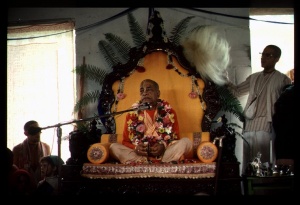CC Adi 13.57-58 (1975): Difference between revisions
(Vanibot #0027: CCMirror - Mirror CC's 1996 edition to form a basis for 1975) |
(Vanibot #0020: VersionCompareLinker - added a link to the Version Compare feature) |
||
| Line 2: | Line 2: | ||
<div style="float:left">'''[[Sri Caitanya-caritamrta (1975)|Śrī Caitanya-caritāmṛta (1975)]] - [[CC Adi (1975)|Ādi-līlā]] - [[CC Adi 13 (1975)|Chapter 13: The Advent of Lord Śrī Caitanya Mahāprabhu]]'''</div> | <div style="float:left">'''[[Sri Caitanya-caritamrta (1975)|Śrī Caitanya-caritāmṛta (1975)]] - [[CC Adi (1975)|Ādi-līlā]] - [[CC Adi 13 (1975)|Chapter 13: The Advent of Lord Śrī Caitanya Mahāprabhu]]'''</div> | ||
<div style="float:right">[[File:Go-previous.png|link=CC Adi 13.56 (1975)|Ādi-līlā 13.56]] '''[[CC Adi 13.56 (1975)|Ādi-līlā 13.56]] - [[CC Adi 13.59 (1975)|Ādi-līlā 13.59]]''' [[File:Go-next.png|link=CC Adi 13.59 (1975)|Ādi-līlā 13.59]]</div> | <div style="float:right">[[File:Go-previous.png|link=CC Adi 13.56 (1975)|Ādi-līlā 13.56]] '''[[CC Adi 13.56 (1975)|Ādi-līlā 13.56]] - [[CC Adi 13.59 (1975)|Ādi-līlā 13.59]]''' [[File:Go-next.png|link=CC Adi 13.59 (1975)|Ādi-līlā 13.59]]</div> | ||
{{CompareVersions|CC|Adi 13.57-58|CC 1975|CC 1996}} | |||
{{RandomImage}} | {{RandomImage}} | ||
| Line 8: | Line 9: | ||
<div class="verse"> | <div class="verse"> | ||
:sapta miśra tāṅra | :sapta miśra tāṅra putra--sapta ṛṣīśvara | ||
:kaṁsāri, paramānanda, padmanābha, sarveśvara | :kaṁsāri, paramānanda, padmanābha, sarveśvara | ||
:jagannātha, janārdana, trailokyanātha | :jagannātha, janārdana, trailokyanātha | ||
| Line 18: | Line 19: | ||
<div class="synonyms"> | <div class="synonyms"> | ||
sapta miśra—seven Miśras; tāṅra—his; putra—sons; sapta—seven; ṛṣi—great saintly persons; īśvara—most influential; | sapta miśra—seven Miśras; tāṅra—his; putra—sons; sapta—seven; ṛṣi—great saintly persons; īśvara—most influential; kaṁsāri—of the name Kaṁsāri; paramānanda—of the name Paramānanda; padmanābha—of the name Padmanābha; sarveśvara—of the name Sarveśvara; jagannātha—of the name Jagannātha; janārdana—of the name Janārdana; trailokyanātha—of the name Trailokyanātha; nadīyāte—at Navadvīpa; gaṅgā-vāsa—living on the bank of the Ganges; kaila—did; jagannātha—the fifth son of Upendra Miśra. | ||
</div> | </div> | ||
Latest revision as of 15:07, 26 January 2020

A.C. Bhaktivedanta Swami Prabhupada
TEXTS 57-58
- sapta miśra tāṅra putra--sapta ṛṣīśvara
- kaṁsāri, paramānanda, padmanābha, sarveśvara
- jagannātha, janārdana, trailokyanātha
- nadīyāte gaṅgā-vāsa kaila jagannātha
SYNONYMS
sapta miśra—seven Miśras; tāṅra—his; putra—sons; sapta—seven; ṛṣi—great saintly persons; īśvara—most influential; kaṁsāri—of the name Kaṁsāri; paramānanda—of the name Paramānanda; padmanābha—of the name Padmanābha; sarveśvara—of the name Sarveśvara; jagannātha—of the name Jagannātha; janārdana—of the name Janārdana; trailokyanātha—of the name Trailokyanātha; nadīyāte—at Navadvīpa; gaṅgā-vāsa—living on the bank of the Ganges; kaila—did; jagannātha—the fifth son of Upendra Miśra.
TRANSLATION
Upendra Miśra had seven sons, who were all saintly and most influential: (1) Kaṁsāri, (2) Paramānanda, (3) Padmanābha, (4) Sarveśvara, (5) Jagannātha, (6) Janārdana and (7) Trailokyanātha. Jagannātha Miśra, the fifth son, decided to reside on the bank of the Ganges at Nadia.